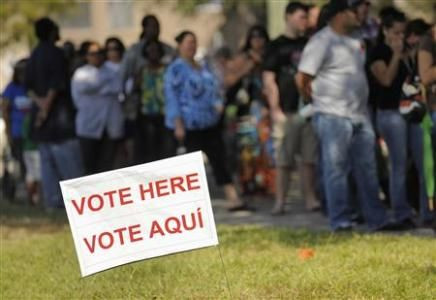
Barack Obama's win in the U.S. presidential election highlighted how population shifts -- ethnic and generational -- have buoyed Democrats while forcing Republicans to rethink their message.
Without recasting their core message and actively trying to expand their base beyond older, mostly white Americans, conservatives could struggle even more in future elections as the nation's population incorporates more Latinos, Asians and other minorities as well as young voters, analysts said.
First-time voters, including many young people and immigrants, favored the president by a large margin, while older voters leaned toward Republican Mitt Romney, showed a Reuters/Ipsos Election Day poll.
Obama won an estimated 66 percent of the Hispanic vote, according to the Reuters/Ipsos election day poll, at a time when the Latino population is growing rapidly in states such as Florida, one of eight or so politically divided states that were crucial in the presidential race. Other estimates put Obama's share of the Hispanic vote above 70 percent.
"The nonwhite vote has been growing -- tick, tick, tick -- slowly, steadily. Every four-year cycle the electorate gets a little bit more diverse. And it's going to continue," said Paul Taylor of the nonpartisan Pew Research Center.
"This is a very powerful demographic that's changing our politics and our destiny," said Taylor, adding that the number of white voters is expected to continue to decline a few points in each future election cycle.
Data has shown for years that the United States is poised to become a "majority minority" nation -- with whites becoming the minority in the country -- over the next several decades. But the election results highlighted the political impact. See link.reuters.com/hyd83t for a graphic.
About 80 percent of blacks, Latinos and other nonwhite voters cast their ballots for Obama, compared with less than 17 percent for Romney, according to Reuters/Ipsos poll. Obama also won about 63 percent of total voters age 18 to 34.
Overall, Romney won nearly 57 percent of the white vote compared with 41 percent for Obama, the polling data showed. The vast majority of votes cast for Romney came from white voters.
Demographer William Frey said that division is troubling.
The United States has long history of racial divide stemming from its roots in slavery and including the civil rights battles of the 1960s.
"We still are a country that's kind of divided, and a lot of that fissure in the population tends to be based in race and age and ethnicity," said Frey, a senior fellow at the Brookings Institute. "There's kind of a dangerous result in this election when we see older whites moving in one direction and younger minorities moving in another direction."
Frey said he sees the gap less as racism and more as a cultural generation gap.
"It's a little bit of a warning sign that we need to pay attention to," he said.
A GROWING PRESENCE FOR MINORITIES
U.S. data released earlier this year showed the number of ethnic minority births topping 50 percent of the nation's total births for the first time..
It will be years before those newest Americans will be old enough to vote, but the demographic shift is clear. Most analysts project whites to be the racial U.S. minority sometime between 2040 and 2050.
Latinos, the fastest-growing demographic in the United States, are a huge factor.
More than 70 percent voted for Obama compared with about 28 percent for Romney, according to Reuters/Ipsos data.
"We are a much more diverse country than we were" just a generation or two ago, said Pew's Taylor, who also oversees the center's Social and Demographic Trends project and the Pew Hispanic Center. The rising number of multiracial children are also likely to become more of a factor, he added.
Obama, whose historic win in 2008 made him the first ethnic minority U.S. president, had a black father and a white mother.
Aging baby boomers also are a key factor in the demographic transition, as older voters "leave the electorate," as Taylor delicately put it, and young voters more accepting of diversity and an active government are added to the rolls.
That could help drive certain civil rights ballot initiatives, like votes in Maryland and Maine on Tuesday to approve same-sex marriage. In each instance, support from younger voters helped put the measures over the top.
"It was an election in which the future won over the past," said Marshall Ganz, a Harvard University lecturer on public policy, said of Tuesday's various contests.
"A RECIPE FOR EXTINCTION"?
Tuesday's outcome poses big questions for Republicans as they seek new national leaders and prepare for the next congressional election in 2014 and beyond.
Conservatives' stance against immigration reform and gay marriage is "a recipe for extinction," said analyst Mike Murphy, a one-time adviser to prominent Republicans including Arizona Senator John McCain, former Florida Governor Jeb Bush, former New Jersey Governor Christie Todd Whitman and Romney, a former Massachusetts governor.
"The question is whether or not we're going to have an adult conversation inside the party about our need to attract more people than grumpy old white guys," Murphy told MSNBC. "Demographically, our time is running out."
Ted Cruz, a Latino Republican elected to the U.S. Senate from Texas, said on CBS that his party had to recruit candidates who connect with that community in a "real and genuine way."
Not all Republicans were willing to concede to demographics. Some highlighted tactical and strategic issues in their lost bid for the White House and their failed efforts to take control of the U.S. Senate.
And analysts said Democrats, too, have lessons to learn.
"It is a very powerful wake-up call to both political parties," said Pew's Taylor.
Brookings' Frey said Democrats still must keep the white vote in mind for at least the next couple of election cycles.
"Whites are not dead," he said. "They're still a big part of this population."
© 2025 Latin Times. All rights reserved. Do not reproduce without permission.




